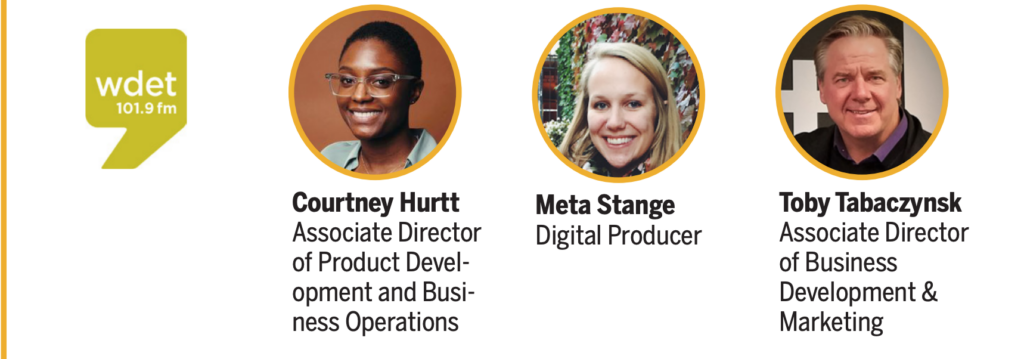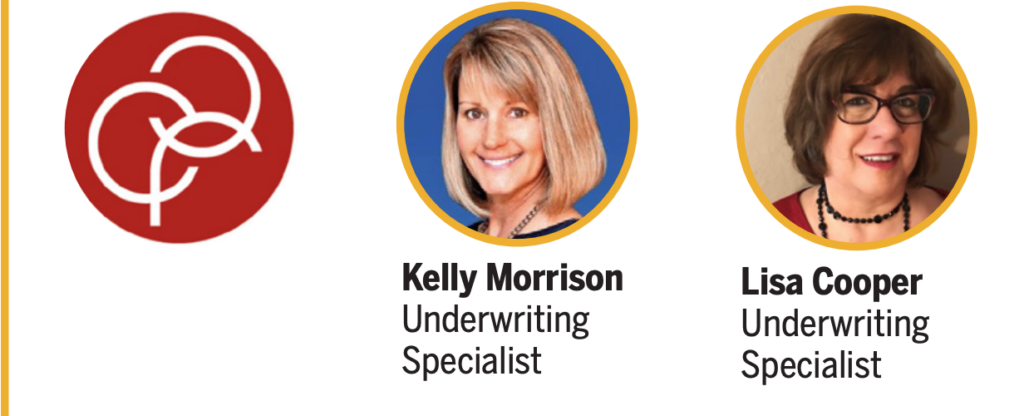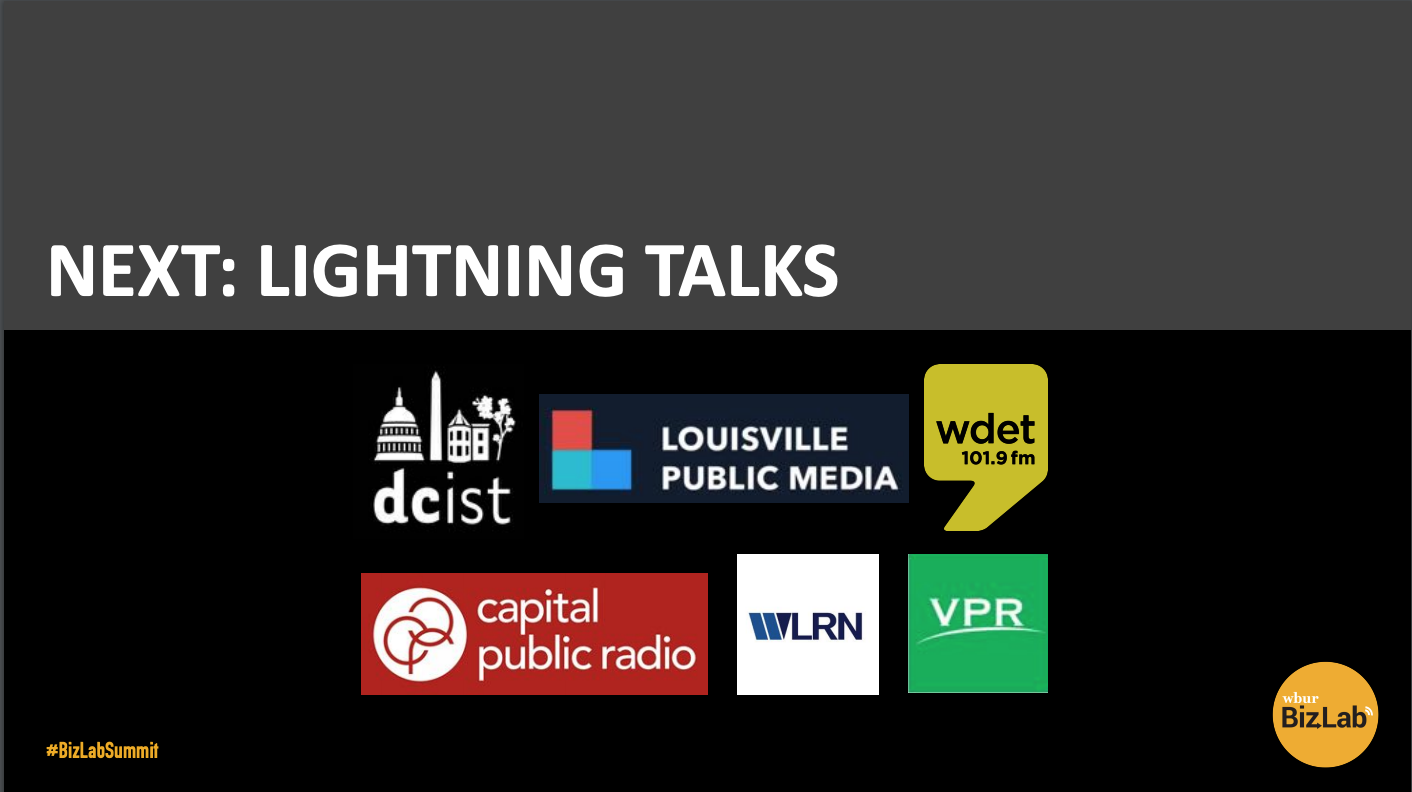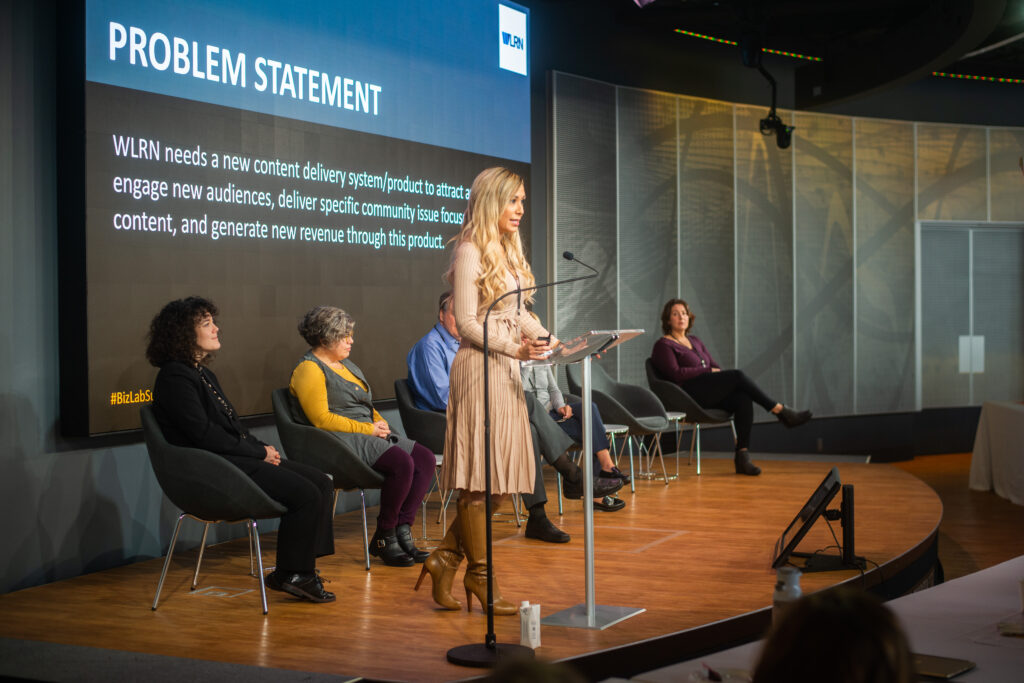BizLab stations across the country spent 2019 testing news ideas for revenue at their stations and in their communities. At the BizLab Summit, each station gave a six-minute overview of their project.
- Download their slides (PDF)
- Watch WDET, Vermont Public Radio, and WLRN’s panel discussion, followed by their lightning presentations
- Watch Louisville Public Media, WAMU, and Capital Public Radio’s panel discussion, followed by their lightning presentations

WAMU, in Washington, D.C., acquired and revived the digital news outlet DCist in 2018, helping to fill a void in D.C.’s news ecosystem. DCist.com has a large and loyal audience, but until now the audience was not directly supporting the website.
DCist’s project with BizLab aimed to craft a robust and unique membership program, distinct to the brand of DCist: knowledgeable, playful, and engaging. To test the team’s assumptions, their BizLab project invited previous backers of a Kickstarter campaign to join a beta membership program. That group was used to test hypotheses about which membership benefits and offerings would resonate. A few months later, the DCist launched its membership program to the public on November 1, 2019 and has seen a heartening initial response.

Louisville Public Media’s work with BizLab centered on integrating their new digital property, Do502, into their existing network of stations and membership offerings. Do502.com is an event listing site with a focus on curated lists that help people find new things to do and new places to explore in Louisville, KY.
Louisville’s BizLab experiments focused on creating and curating events specifically for the Do502 audience. Early research in the project uncovered that Do502 readers crave limited-access engagements and exclusive series, and the team used their project to explore how to engage their audience in this way. The team also experimented with how to launch and promote a membership to Do502, distinct and separate from Louisville Public Media’s existing membership program.

WDET, Detroit’s NPR Station, has identified many local, small businesses who are aligned with the station’s values, but can’t afford typical radio underwriting pricing. Additionally, it is neither efficient nor profitable for a WDET underwriting representative to pursue sponsorship at the level of a small business budget.
WDET worked with BizLab exploring social media underwriting opportunities for small businesses. Through in-person interviews, WDET discovered that small businesses frequently use Facebook and Instagram to promote events and drive traffic. They also learned these businesses care about the local community, telling their unique story and providing a niche service and product. They love WDET’s non-profit mission and its reputation within the local community. With this information, the team tested a WDET-branded social media post product on Facebook and Instagram that affiliated the small business with the WDET brand and halo, reaching a network of potential consumers. By prototyping it as an online, semi-automated process to sell and produce, WDET created an affordable underwriting product.

Capital Public Radio, in Sacramento, CA, has an existing network of NPR stations across California where in exchange for Capital Public Radio’s State Capitol reporting, partner stations provide weekly underwriting units on their airwaves. The BizLab project was focused on re-designing the function and mission of this network, Capital Public Radio Network (CPRN).
CPRN enjoyed financial success in its early years, through selling these partner station underwriting units, but revenue began to decline in 2009 and eventually fell to zero. Through BizLab, the team explored how to resurrect, restructure, and return CPRN to financial sustainability, by redefining the product in terms of the value it offered to underwriters: a one-stop-shop for reaching NPR listeners across the state of California.

WLRN in Miami has invested in their local coverage of the environment and climate change with a commitment to hosting local events and hiring an environment reporter. WLRN’s goal in their BizLab project was to explore how to generate revenue through this topical coverage and the creation of an environmental newsletter.
Their BizLab experiments tested different newsletter content, styles, and format, and then expanded into a technology integration project: the team brought in News Revenue Hub to integrate their newsletter, payment and CRM platforms. The final environmental newsletter product combines journalism and community engagement through the delivery of specialized content on a significant community issue. The newsletter is driving new membership, increasing current levels of giving, and is a vehicle for targeting specific underwriters for this newly developed product.

Vermont Public Radio’s vision is “exploring the whole Vermont story, together” – no small task when you consider VPR is a statewide public radio service in a rural state with few concentrated population centers. In 2018, during VPR’s 14-county listening tour, listeners consistently asked for more coverage of their local communities. VPR’s BizLab project centered around the idea of making the station “feel more local” in Windham County, located in Southern VT, to determine if this would increase loyalty, engagement, and ultimately, revenue.
To accomplish this, in partnership with VPR’s dedicated Southern Vermont reporter, the team worked to raise the visibility of regional content and the reporter’s profile in the community via social media and a new email newsletter. They also increased engagement with the community by soliciting story ideas and planning a “News & Brews” event to involve residents in the news gathering process. They are now also exploring the possibility of geo-targeted underwriting opportunities that would allow local businesses to reach their local customers.

